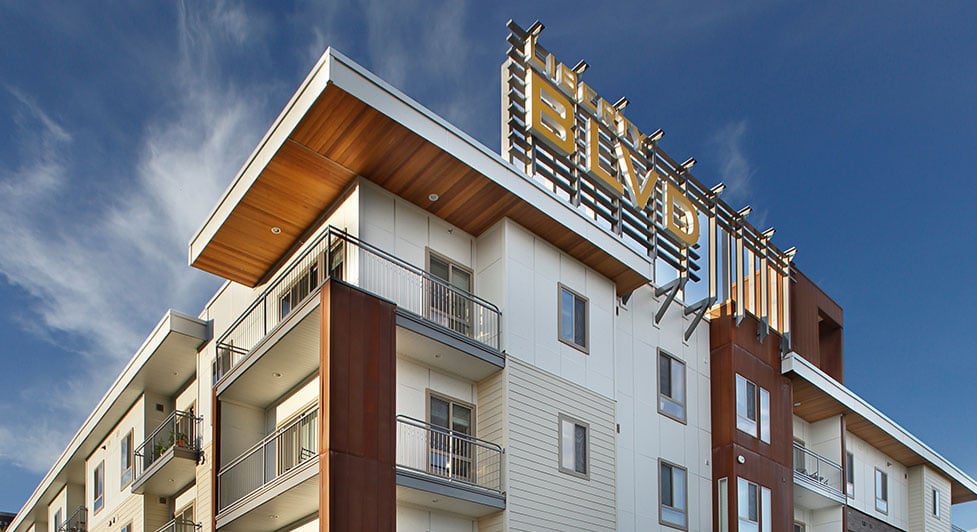For founder, president, and CEO Dan Lofgren, the success of Cowboy Partners, the veteran Salt Lake area real estate developer, rests on its willingness to take the long view. The management team never views a decision in isolation. Whether it’s something as simple as the placement of a light switch or as complex as the capital structure of a high-rise development, the team always considers how the decision will contribute to their ability to deliver sustainable long-term returns for their capital partners.

This approach dovetails nicely with another of the company’s values: its regard for the experience of its residents. “We create value for our investors by focusing on our residents; choosing locations carefully, understanding the people who are likely to be attracted to that location and building communities that enhance their lifestyle,” Lofgren said. “For us, the mark of a community that delivers sustainable value is that residents feel great about where they live.”
It’s clear for Lofgren and his colleagues that their emphasis on serving residents is not motivated simply by finances. It also reflects a deeply felt ethical position. Lofgren took time out from his schedule to talk to Lument about the difference quality housing can make and the role his network of trusted partners — and especially his lenders — play in facilitating Cowboy Partners’ ability to pursue its strategy. Partner Mark Cornelius and Lee Dial, the company’s COO/CFO, also joined in.
Are your objectives today substantially different from those you had when you started the firm in 2001 with Mark and Scot Safford?
Lofgren: Our sense of what we are doing has remained remarkably consistent. Within our focus on multifamily, our object was to diversify along the spectrum from suburban townhouses to deeply targeted and mission-focused affordable housing to high-end urban product — and that’s what we have done. We also established a core portfolio strategy focused on a long-term hold for cash flow. While we have executed a sale or two along the way, we continue to look at every asset with the intent of owning and operating it for the long term.
We also established at the outset that we would concentrate our efforts in a few key markets where a robust economy and vigorous job growth drive demand for housing and, this is important, where we had the depth of experience to make decisions like locals. For us, that meant communities along the Wasatch Front in Utah, where we are in fact locals, and in the San Diego and Orange County areas, where we have had significant prior experience. The extraordinary growth the Wasatch Front experienced over the last decade has meant there have been ample opportunities to occupy us in Utah, but we are continuing to look for and nurture opportunities in San Diego.
We have to ask: Why the name, Cowboy Partners?
Lofgren: I wouldn’t read too much into it. The truth is that I don’t even own a pair of cowboy boots. Nonetheless, the name has proven to be wildly memorable, which is an advantage. I have yet to meet someone who confuses us with another company.
Affordable housing is clearly important to you and a fundamental part of your mix. What’s behind this?
Lofgren: It’s hard to talk about this without sounding self-righteous. I don’t mean to suggest that we are doing something extraordinary. We simply look for opportunities where we can make a contribution. In truth, there is no aspect of a community that isn’t enhanced by nurturing housing affordability and housing stability. Consider healthcare, education, crime, traffic, air quality, you name it, and I can tell you how affordable housing contributes to making a community a little bit better. Being able to make affordable housing work is a bit of added texture to what we do, and we really cherish the opportunity it gives our whole team to contribute to the community.
That kind of commitment also seems to come from personal conviction.
Lofgren: That’s right. I had the experience early in my career of returning to one of the first low-income housing tax credit properties that we did. It’s located in a little draw, and when I came down the hill in my car, I could see scores of elementary school kids racing across the village green, playing catch, shouting, and otherwise having a great time.
That was an “oh-my-goodness” moment. I realized that having access to targeted affordable housing made a difference to these kids in the moment and, even more profoundly, could influence the trajectory of their lives. Having a safe stable home, being able to attend the same school year after year, feeling proud of where they live–all these things can have an immense effect on one’s chances.
Flash forward to the present, where I recently had a conversation with a gentleman who lives in one of our mixed-income communities, where 20 percent of the units are set aside for households at 50 percent AMI. He had lost his sight, but he wanted me to know that being able to live there on his earnings as a part-time massage therapist made him feel that he counted as a person. You only have to have a few of these experiences, and you become pretty devoted to the idea of housing affordability.
How does this view factor into how you describe success?
Lofgren: The sense of contribution that comes from affordable housing is a big part of it, but we are business people, and we have a steady focus on what we consider to be our key performance indicators. In a generalized way, we view success as creating the stability and resiliency that gives our investors confidence and peace-of-mind , year after year.
Cornelius: Another important way we measure success is the satisfaction of our residents. Are we making the kinds of decisions that will encourage residents to stay with us? When Dan talks about the resiliency of our portfolio, that is one of the things he is referring to. Simply, if we have happy residents, we will have happy investors.
How has the importance you place on resiliency and stability shaped your response to the pandemic?
Dial: I think the trust we have built up with our residents has made a real difference. They know that we value their health and safety, that we have their long-term interests at heart, so they have been very cooperative. For instance, we have had to close some community amenities that are dearly loved by our residents, but no one has objected. And that means that they are more cooperative when it comes to wearing masks and using hand sanitizers. The online portal we set up for resident payments and work orders has also been a plus.
It’s part of our long-term resiliency plan to be prepared for emergencies. We have cash reserves for each property, and that has enabled us to absorb additional costs and sustain the level of performance we provide residents. In addition, we’ve launched a deferred payment option. Our residents are hard-working people who may have lost a job due to the pandemic, and we wanted to make it possible for them to stay in their homes until they landed on their feet again. In many cases, they have worked things out fairly quickly. Helping residents weather the storm clearly contributes to what is best for our investors by contributing to the stability of our communities.
As you look to the future and beyond, what factors will be important to your success?
Cornelius: Much of the resiliency we’ve been talking about and our ability to contribute to the lives of our residents in good times and bad comes from the capital structure of each development — and that means that an important part of our team is our lender.

We are fortunate in having worked on our HUD financing with Lument originator Rick Andrews and underwriter Gus Serrano for the better part of 20 years. They understand who we are, how we work, and what we are trying to accomplish.
Lofgren: I suspect that we’re on the phone with Rick once or twice a week, even if we don’t have a project in process. And their former boss David Goodman was there every step of the way, watching over our relationship and working with tremendous grace to make sure we were continually positioned, continually aware, continually equipped to do the very best job we can. We can’t thank him enough.
We get calls all the time from people wanting to help us with our HUD financing. I always want to be respectful of their efforts to recruit our business, but, in all candor, it is not even a temptation to get involved with them because we are confident that we already have the right lenders on our team.
How do you see the post-pandemic world for multifamily?
Lofgren: While there is a great deal of development taking place in our core markets right now, not nearly enough of it is income targeted. We are spending a lot of time thinking about the best ways to make affordable housing good business going forward, and Lument is playing an important role in these discussions.
